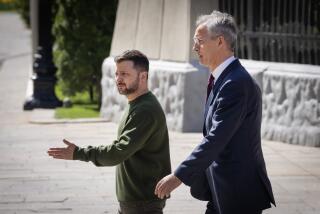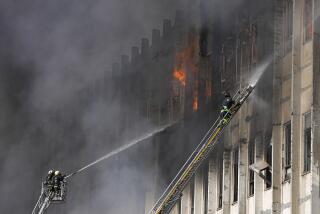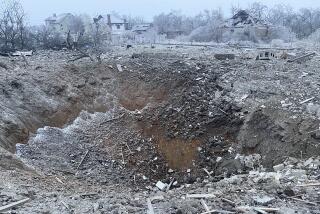Serbs Get 2nd Reprieve on Bombings : Bosnia: Rebels are spared NATO air strikes for 72 hours to continue pullback of weapons. Government army pushes a major offensive.
- Share via
SARAJEVO, Bosnia-Herzegovina — Bosnian Serbs won a second 72-hour reprieve from NATO bombing Sunday by withdrawing a “significant” number of tanks, howitzers and mortars from the hills surrounding this capital, U.N. officials said.
Under threat of renewed air strikes, the Serbs moved roughly half of the estimated 300 heavy weapons that they had aimed at Sarajevo by the time a 10 p.m. deadline rolled around. They now have until Wednesday night to finish.
The pullback came amid a fast-paced, U.S.-sponsored diplomatic drive aimed at ending the siege of Sarajevo and settling the 3 1/2-year war, even as the Bosnian government pushes its most successful battlefield offensive ever.
Bosnian Serb leader Radovan Karadzic admitted that his army sustained “heavy losses” in fighting in northwestern Bosnia-Herzegovina that has dramatically shifted the balance of power and territory.
In a joint statement issued Sunday night, the U.N. military commander in the former Yugoslav republics, Gen. Bernard Janvier, and Adm. Leighton Smith, head of NATO’s Southern Command, said the Serbs had made a “substantial start” in withdrawing their big guns from a 12 1/2-mile exclusion zone around Sarajevo.
“It must be completely understood that the Bosnian Serbs must fully respect their commitments during this additional 72-hour pause or the air strikes will resume,” the two commanders said.
In Washington, President Clinton agreed with the decision to postpone the bombing threat, White House spokesman David Johnson said.
However, he added: “I think the President made very clear on Friday that, if there is not full movement out of the exclusion zone, then we would recommence the bombing.”
The North Atlantic Treaty Organization and the United Nations agreed to suspend their 16-day bombing campaign for 72 hours on Thursday when the Serbs pledged to withdraw their weapons and open air and land routes into the city.
If the Serbs showed progress, it was decided, they would be given another 72 hours to complete the withdrawal.
Although the Serbs blocked U.N. troops when they tried to move down a highway through the Serb-held suburb of Hadzici, the airport and another highway have been opened to U.N. and humanitarian-aid traffic.
Janvier, Smith and the Serbs said they are prepared to move to the next step: signing a cease-fire agreement for Sarajevo and a broader cessation-of-hostilities pact for the country.
It is now the Bosnian government, buoyed by a string of military victories in northwestern Bosnia, that finds itself in the rare condition of being able to negotiate from a position of strength.
The government claims, and the United States, for the most part, confirms, that 8% of what was Serb-held territory has been recaptured by Bosnian government forces and their Croatian allies in the last week. Whereas the Serbs controlled 70% of Bosnia until recently, they now have about 55%, according to Western officials.
On Sunday, government radio reported that the army had added another town to its collection, Sanski Most, and was on the outskirts of Prijedor, site of some of the worst concentration camps where Serbs imprisoned Muslims at the beginning of the war.
The army is now able to pose a threat to Banja Luka, the rebel Serb stronghold and military headquarters in northern Bosnia. The city has in the last week drawn tens of thousands of refugees fleeing the fighting in the area.
“The best diplomacy is created on the ground,” Bosnian Foreign Minister Muhamed Sacirbey said. “We’ve had to learn that lesson the hard way. Now we’re the beneficiaries of that lesson.”
Prime Minister Haris Silajdzic said his government is in “the driver’s seat” of the war for the first time since it began in April, 1992, with a Serbian rebellion against Bosnia’s efforts to become a nation independent of the Serb-led Yugoslavia.
Sacirbey and Silajdzic spoke to reporters after a meeting with U.S. envoy Richard Holbrooke, patron of a U.S. diplomatic initiative to end the war.
Holbrooke said compliance by the Serbs in withdrawing their weapons from the Sarajevo area would lead to the permanent lifting of the siege, “an enormous impetus to peace.”
“The next few days and hours may well determine the fate of the war,” he said after arriving at the newly opened Sarajevo airport in a U.S. Air Force craft.
The Serbs seemed stunned at their losses, and they placed the blame squarely on the NATO air campaign that devastated their communication and command-and-control centers and their ability to reinforce troops quickly.
“We are having a hard time defending the western part of the [Bosnian] Serb Republic, where the world is doing nothing to stop this offensive by Muslim and Croatian [militia] and regular Croatian forces,” Momcilo Krajisnik, hard-line leader of the Bosnian Serbs’ self-styled Parliament, told Bosnian Serb television Sunday night.
Karadzic, in an interview with Russia’s Itar-Tass news agency, said his army is trying to form a “new line of defense.”
“As a result of that offensive, we have sustained heavy losses and lost several towns and territories which have belonged to the indigenous Serbs for centuries,” Itar-Tass quoted Karadzic as saying.
The government claimed its 2nd and 3rd Corps were closing in on Doboj, a strategic town 50 miles east of Banja Luka, while the 5th and 7th Corps were attempting to link at Sanski Most, 30 miles to the west of Banja Luka.
Bosnian state television showed Gen. Atif Dudakovic, the 5th Corps commander who is considered the best among Bosnia’s army officers, directing troops outside the town of Sanski Most shortly before it fell to government forces.
Holbrooke seemed to dismiss the impact that the surge in fighting would have on his peace process. But other sources expressed concern that the offensive would strain the loosely formed Muslim-Croat federation, especially if the Croats seize more territory than is allotted to them under terms of any peaceful settlement.
In a bid to shore up the federation, Holbrooke announced a meeting Tuesday between Bosnian President Alija Izetbegovic and Croatian President Franjo Tudjman in the Croatian capital, Zagreb.
Attempting to put to rest one controversy, Holbrooke said the exemption of some heavy weapons from those that the Serbs were required to pull out was a “clerical error.” He said it was never intended that the Serbs would be allowed to keep 82-millimeter-caliber mortars and 100-millimeter-caliber artillery in the Sarajevo exclusion zone.
However, the threshold is still higher than U.N. officials wanted. They originally ordered removal of all weapons of caliber greater than 12.7 millimeters.
More to Read
Sign up for Essential California
The most important California stories and recommendations in your inbox every morning.
You may occasionally receive promotional content from the Los Angeles Times.














